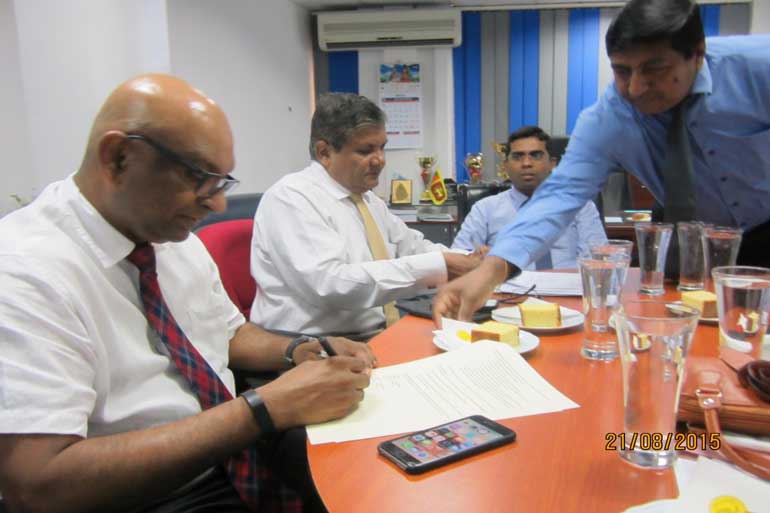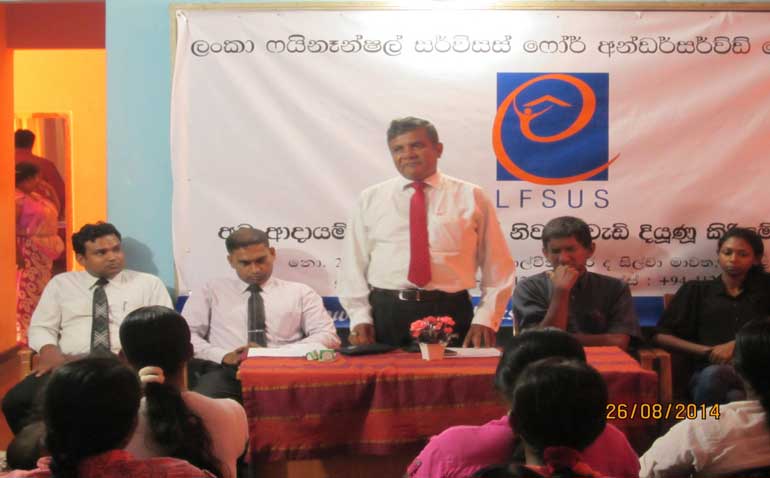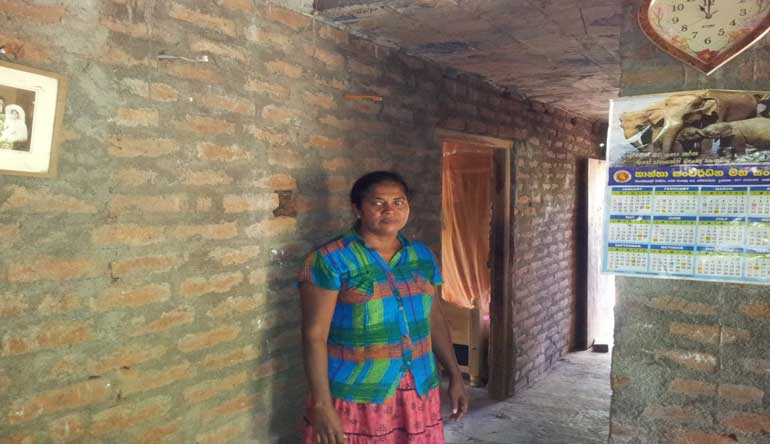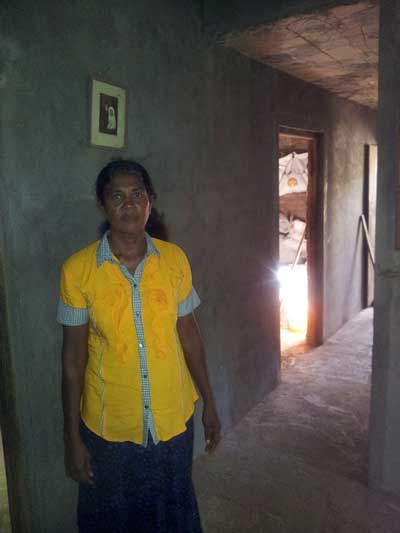Wednesday Feb 25, 2026
Wednesday Feb 25, 2026
Monday, 2 November 2015 00:00 - - {{hitsCtrl.values.hits}}

Signing of tripartite agreement with Sri Lanka Savings Bank and Pragathisewa Foundation, Shrawasthipura. LFSUS Chairman Chandula Abeywickrema and General Manager Gamini Swarnapala place their signatures on behalf of LFSUS

Loan distribution ceremony at Medawachchiya. LFSUS General Manager Gamini Swarnapala addressing the gathering. NDB Bank and LFSUS officials look on

K.B. Mangalika, from Debaraarawewa, a member of the YES Foundation, Tissamaharama – before the project

After the project completion: “There was a time when no bank would help me with a housing loan. Today thanks to LFSUS, I have a roof over my head and a better shelter for my family,” K. B. Mangalika
 By Gamini Swarnapala
By Gamini Swarnapala
Low income housing has had a beneficial effect on the lives of those living on a daily wage. A roof over their heads in a permanent house has proved to be the best they can get for what they can afford.
Supporting the under privileged segment is a national requirement.
Generally, these people are innocent and trustworthy, but are challenged with financing their houses. Commercial banks would not look at their requirements as the loan is small, the profitability low and on the other hand they will not get expected collateral.
Most villagers cannot offer acceptable securities to banks for housing loans as – their lands are un-divided or the ownership lies with the parents, no proper deeds to mortgage, no plans and less valuation etc. On the other hand, many banks or financial institutions are not keen on lending to this segment due to high risk probability, and no guaranteed pay back method.
It was noted in most rural and urban areas, communities formed their own groups, societies, and community based organisations (CBOs) to help each other in many ways. They have their own savings system to deposit small savings; daily, weekly or monthly and consider some short term financial assistance for festivals or distress by way of loans based on their financial strength. These small segments are linked with large organisations such as Micro finance Institutions (MFIs) and Non-Governmental Organisations (NGOs).
These organisations also collect savings from individuals and small groups and lend to members mainly for livelihood activities. Their relationships with members and knowledge of savings habits and loan affordability/repayment capacities etc. are built through volunteers and village leaders.
Though banks have the capacity to lend money, they do not have a proper mechanism to reach this interior segment, yet MFIs have the capacity to reach this segment but lack sufficient direct lending funds.
In this respect, Lanka Financial Services for Underserved Settlements (LFSUS) have stepped in to provide credit enhancement mechanisms to encourage banks and MFIs to bridge the aforementioned gap. LFSUS arranges for banks to use MFIs as a vehicle to reach rural folk and make them bankable.
The origin of LFSUS
LFSUS was established as a company limited by guarantee in 2007 in partnership with the United Nations Human Settlement Program (UN-Habitat) and the Ministry of Urban Development.
The United Nations in its endeavor to address the issues of poverty, sanitation and housing for billions of marginalised communities across the world, set up The Slum Upgrading Facility (SUF) Pilot program of UN-Habitat in 2004 to address these issues. The projects were initiated in Kenya, Tanzania, Ghana, Indonesia and Sri Lanka. The success of this program in Sri Lanka has opened new vistas for future development and expansion. UN- Habitat provided US $ 1.4 million to LFSUS as seed capital to implement the credit enhancement facility.
LFSUS in partnership with banks provides a wide gamut of housing requirements. The methodology adopted is a Guarantee mechanism of LFSUS as a comfort for bulk bank loans granted to MFIs in order to grant small housing loan facilities to rural folk.
LFSUS project partners
Today, there is much interest from various project partners developing the low income settlements. They hope to bridge the gap between formal financial institutes and the community. Formal financial institutions, such as commercial banks, have little if any experience in assessing the risks involved in lending ‘settlers’. Therefore LFSUS provides community a means of accessing loans through project partners.
The methods adopted by the organisation in distributing retail loans to the community and by sustaining timely repayments will help sustain a self-sustaining project, which in turn will help to expand the MFI’s portfolios. They will also receive technical guidance and support as required and advice on overall risk reduction, cost reduction and mitigation procedures while developing ongoing projects. The additional strength and networking ability LFSUS provides helps in negotiating loans with commercial lending banks at acceptable prevailing market rates. LFSUS would carry out its own due-diligence on these projects individually.
A new commercially viable venture of this nature has not been implemented before; therefore this opens up an untouched market for banks, enabling them to broaden their portfolio in order to progress and reward while focusing on long term aspects of their business instead of being complacent with the existing customer base.
Low income householders in urban areas have great difficulty in accessing loans from commercial banks as they are viewed as not being ‘credit worthy’ and reliable. Through these projects, they are able to access new financing opportunities to empower and build better living standards – the selected householders for loans under this model are not poorest of the poor.
Through the initiative of the Ministry of Urban Development and other related Ministries, the Sri Lankan Government envisions creating a country free of slums by the year 2020. For this program to advance further LFSUS assists in bridging the gap between the public and private sectors, paving the way towards their overall goals as these low income group are in fact the government’s responsibility.
Uplifting living standards
Since its inception LFSUS has made a significant impact in uplifting the living standards of rural communities spread across the country. LFSUS launched 20 projects and successfully uplifted nearly 2000 families benefiting nearly 6000 people in Sri Lanka’s Central, Western, Sabaragamuwa, Southern and North Central provinces. Of these projects, seven are complete with loans repaid in full on due dates – evidence that the scheme is a successful one.
With the dawn of peace after three decades, LFSUS has now earmarked the war devastated regions of the Northern and North Central provinces to carry forward the housing initiative to the people rebuild their lives after 30 years of strife with a “house” they could call it their own.
LFSUS recently arranged three bulk loans of Rs. 10 million each for three MFIs in Medawachchiya, Kebithigollewa and Shrawasthipura, benefitting 265 families and 1200 people for housing, house upgrades, sanitation, waste water management, access to clean water and lighting among other common amenities.
Up to now LFSUS is linked with HSBC, Hatton National Bank, NDB Bank, Rural Development Bank, and Sri Lanka Savings Bank. The HDFC Bank, Sanasa Development Bank and Bank of Ceylon will join with LFSUS in the near future to assist this worthy project.
LFSUS invites blue chip companies to link with them to embark on ‘Village adoption programs’ through these housing initiatives under their Corporate Social Responsibility (CSR) project.
(The writer is General Manager, Lanka Financial Services for Underserved Settlements.)